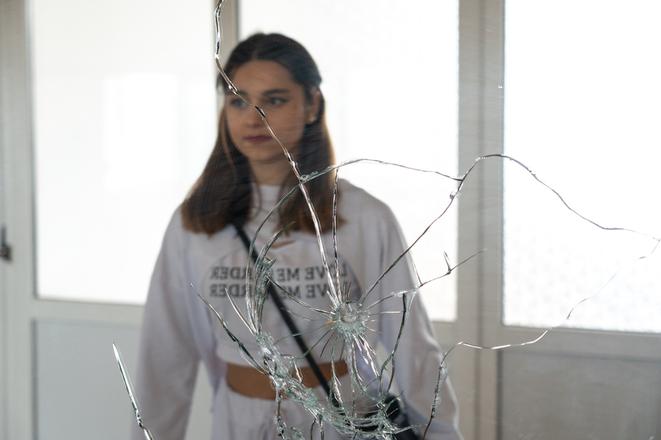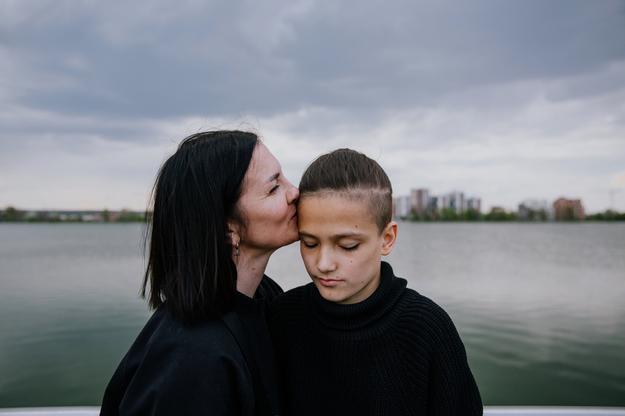One year in the full-scale war in Ukraine, its impact on mental health and wellbeing is becoming apparent. According to the World Health Organization (WHO), nearly 10 million Ukrainians may be suffering from deteriorating mental health conditions. UNICEF estimates that 1.5 million children in Ukraine are at risk of depression, anxiety, post-traumatic stress disorder and other conditions.
This includes Ukrainian families who have fled to Slovakia. A third of Ukrainian households surveyed by UNHCR in 2022 declared that at least one of them was so upset, anxious, worried, agitated, angry or depressed that it was affecting the person's daily functioning.
Adolescents are particularly at risk of mental health concerns. Globally, more than 13 percent of adolescents aged 10 – 19 live with a diagnosed mental disorder. The WHO states that suicide is the fourth leading cause of death for adolescent boys and girls aged 15 – 19 and the third most common cause of death for adolescent girls.
Reality is that not many adolescents may be able to express that they need help. They usually employ non-clinical terms such as sadness, loneliness, fear, shame, boredom, anger and defeat. How can we make sure Ukrainian and Slovak adolescents get the support they need?
Let’s look at the world around adolescents.
Schools
Schools are not only about learning, but also about meeting friends and being part of a group. In fact, when we ask Ukrainian teenagers what they like the most about school, their answer is always the same: friends. They are essential for mental health and well-being; but only one in three Ukrainian children in Slovakia are currently enrolled in school.
Some adolescents follow online school in Ukraine. While they can attend to their education needs, they still miss out on the social aspect of school. This becomes more important when we remember that many may be facing mental health challenges, and that’s why we need to accelerate enrollment of Ukrainian adolescents in schools, so they can be integrated and thrive in Slovakia.
Peers
Strong connections with peers – and the unique support they provide – is essential for adolescents’ well-being. Many Ukrainian adolescents in Slovakia did not have a chance to meet friends. That’s a reason why UNICEF is working with Slovak youth organisations and authorities to increase leisure and peer-exchange opportunities for Ukrainian and Slovak adolescents. This is important because through arts or sports, teenagers can also deal with their emotions and process them in a safe space, while having fun and making new friends.
However, peer relationships can also be challenging: some Ukrainian students, for instance, report being bullied due to their nationality. To address this, UNICEF works with schools so that they can provide a tolerant and respectful environment as well as activities that facilitate positive relationships and promote inclusion, but, unfortunately, much still needs to be done.
Family
Families play a central role for adolescents’ mental health and well-being. They can provide protection and a sense of stability and solid ground, but they can also exert violence, abuse and neglect or pressure and control. Families from Ukraine – many forced apart and now headed by women – are facing economic pressures, anxiety and trauma. Therefore, UNICEF and its partners provide mental health support, promote psycho-social wellbeing and parenting advice to families and caregivers from Ukraine.
Social Media
Social media is essential for Ukrainian adolescents to connect with families and friends, but they also represent a risk. With no “real” friends, adolescents become isolated and may face cyber-bullying and other online risks. This is why UNICEF is increasing direct engagement with adolescents, to make them feel more included, give them a voice and to increase protection from social media-related risks.
Coping, self-help and help
Ukrainian and Slovak adolescents can do a lot to improve their coping mechanisms, get self-help and lend each other a hand. The Child Helpline (Toll-free and anonymous hotline: 116 111) provides 24-hour support to children and adolescents in Slovakia. The Mental Health League offers community services in 80 locations. And finally, helping each other is a way to help ourselves. As President Zuzana Čaputová said in the #Pomahajmesi (#Let’sHelpEachOther) campaign:



 Some Ukrainian students report being bullied due to their nationality. UNICEF works with schools so that they can provide a tolerant and respectful environment as well as activities that facilitate positive relationships and promote inclusion. (source: UNICEF/UN0669438/Filippov)
Some Ukrainian students report being bullied due to their nationality. UNICEF works with schools so that they can provide a tolerant and respectful environment as well as activities that facilitate positive relationships and promote inclusion. (source: UNICEF/UN0669438/Filippov)
 Olesia, from Kyiv, kisses her teenage son Matvii, who lives with a disability (source: UN0668145 - The Village media)
Olesia, from Kyiv, kisses her teenage son Matvii, who lives with a disability (source: UN0668145 - The Village media)